←Return to Chapter 6: Keeping My Head Above Water
(A reminder that I've included links to people, places, and things you might find interesting.)
Back in the late 1990s, I stunned a lot of friends and coworkers when I left my corporate job to write fiction full-time. Even though I transitioned from one career to the other by dropping back to part-time contractor on my programming job for a year and writing several manuscripts at the same time, many people commented when it came down to it, they didn't think I'd really leave. After all, it was a little crazy to think I could make a living writing romance novels, and it flew in the face of image people had of me. (Predictable, risk-averse, conservative, company girl.) And did I mention I left the company my father retired from? And what about that degree in computer science I was walking away from? And an MBA? Hadn't I wasted all that time? Because you don't need a degree to become a novelist. If I'd been on the outside looking in, I probably would've looked askance at me, too.
At the same time, I was bombarded by other people with requests to "pick my brain" over how they could leave their jobs to follow a more creative path. And if I had a dollar for every time I've been asked that question over the past three decades, I wouldn't need a job at all. 😊 Those requests accelerated during the 2020 pandemic when many people decided working from home was preferable to commuting, and the movement that become known as "The Great Resignation" ensued, with people giving up their corporate jobs in herds to pursue their passion.
So what would I tell someone who aspires to give up their day job to become a full-time writer, painter, crafter, musician, actor, singer, or other creative pursuit?
I'd try to talk them out of it.
Bear with me here. If someone has the impulse to pursue a vocation (here's the important part) in which other people will work for free, it's going to be an uphill climb. Specifically:
It's hard to make a living as a writer when lots of people are happy to pay someone to publish their work and then give away their book just to see their name on the cover.
Likewise, it's hard to make a living as a painter when lots of people will create paintings and give them away. It's hard to make a living creating handcrafts when lots of people do it as a hobby and give away their creations or are happy to break even on their investment. It's hard to make a living as a musician, actor, or singer when so many talented people are willing to take the gig for free just to get the exposure.
So if I can dissuade someone from following their "dream" in one conversation, they don't have what it takes to make it IF their goal is to make a living from their passion.
In other words, it's simple economics of supply and demand. If you want to do what a lot of other people want to do, and you expect to make money doing it, you should be prepared to work your tuckus off to get great at that thing because the competition is keen.
So for someone seeking my advice my initial questions would be:
How long have you wanted to do this?
What is your goal?
What have you done so far toward this goal?
What kinds of things do you plan to do in the future to move you toward your goal?
What kind of timeline are you on?
What would success look like to you?
What would make you quit?
The point is, if the person I'm talking to has a head full of dreamy notions about being a creative and they're on the verge of quitting their job to do it, I want them to stop and consider the realities. Because if the person quits their job to throw themselves into something unprepared, chances are they're going to fall short, and now they're in financial straits. Then they throw up their hands and retreat and feel like a big failure.
And I don't want you to feel like a big failure. I want you to follow your creative pursuits in a way that will enrich your life. Creative pursuits are supposed to be fun and something you look forward to, rather than mired in expectations and the stress of producing a revenue stream.
There are some caveats, of course, that will increase the likelihood of success. If you have connections inside whatever industry you're trying to crack, that will absolutely give you a leg up. If, for example:
—you want to be a writer and you're a descendant of Ernest Hemingway
—you want to be a painter and your aunt owns an art gallery
—you want to be an artisan and you learn an obscure craft from a known expert
—you want to be a musician and you have a buddy who's a successful studio sound engineer
—you want to be an actor and your college roommate works in Central Casting in Hollywood
—you want to be a singer and you live next door to Kelly Clarkson's mother
Then you might be able to milk that connection to get you closer to the front of the line. But again, you have to be ready to take advantage of that break when it happens by wowing the decision-makers with your talent.
I'd like to debunk one myth that seems common among people who want to jump to a creative career: that if you quit your job, you'll have more time to do your creative work. That's not necessarily true. I wrote just as much (and maybe more) when I was working full-time and part-time on my corporate job. When you have a certain amount of time to do your creative work, you have to do it; when you have all day to do that same amount of work, you might get to it… but more likely, you'll while away the day doing other things and then tell yourself you'll get a fresh start the next day. And then one lost day bleeds into the next, and the next. I speak from experience! The first few days after I left my corporate job felt a little "floaty." I suddenly had more time to write than ever before, and suddenly, the urgency to get to my wordcount was a little less. And frankly, after basically working two full-time jobs for years, I felt as if I deserved a little break.
But it totally messed with my momentum. Thankfully, my delivery deadlines helped me to get back on track. If you quit your job without having paying customers and delivery deadlines for your creative pursuit, you'll have to summon a herculean amount of discipline to stay productive. With all these things in mind, I counseled friends and relatives to be conservative when making their own transition to a creative career. And for my effort, I was often met with the response that I was a "killjoy" and/or that I "had my thing but didn't want anyone else to have their thing."
As if I wanted to keep this creative career space all to myself!
So despite my advice, several friends and people close to me left their corporate jobs abruptly only to realize several months down the line that they had unrealistic expectations about 1) their skill level as compared to the competition, 2) the demand for their product or service, or 3) the financial truths of running a creative business. Things did not end well for these people—their reactions ranged from disappointment to downright bitterness as they were forced to rejoin the corporate work force. (Especially painful for the ones who quit their original job in a performative blaze of glory.) I observed all of this with a sick feeling in my stomach because I saw them eventually turn away from their creative pursuit, probably for good.
One friend quit his lucrative project management job to flip houses… turns out he was watching way too much HGTV. He nearly bankrupted his family.
Another acquaintance left his corporate job to pursue a new painting hobby as a career and spent the next couple of years learning the harsh realities of the highly competitive field of art before calling it quits.
Another friend with no experience running a business quit her job to buy a struggling coffee shop, with the idea of turning it into a bookstore. One year later she sold the shop at a loss and returned to her previous field, now under a mountain of debt she'd acquired.
The better approach? Baby steps. If you're feeling stifled in your day job, consider looking for ways to expand or change your job description to include more creativity, or look for a new position within your current company. If that isn't possible, use time outside of your day job to deepen your knowledge or skill set in your creative field—take night or evening classes or find ways to volunteer your services. Get an internship or part-time job to "shadow" people who are already doing what you're doing to see what it's like. Use this time to practice getting great at your creative calling before you're under pressure to make money doing it. At the end of these exercises if you still aspire to make your passion your career, your chances of success will be exponential what they would've been.
A good resource for those who are feeling called to follow their passion is So Good They Can't Ignore You by Cal Newport. The author proposes that enthusiasm alone isn't enough to achieve success in a chosen field. You have to develop enough skill to carry you through, and in acquiring the skill, you will learn so much about yourself and your capacity for risk and hard work. You might decide you'd rather turn your creative calling into a beloved hobby versus a vocation... or you might decide to double-down and become even more committed to making the jump to a creative career. Regardless, if you've been considering a career change to follow your passion, I hope this helps you decide your next step.
Okay, back to my passion of writing fiction!
I'd learned a lot from writing KIDS is a 4-Letter Word—I was starting to get the hang of what was being asked of me by my Harlequin editor for the Love & Laughter line I was writing for. While writing KIDS, my critique partner Rita Herron made the comment that she thought the secondary character Pamela Kaminski, deserved her own story. I loved the idea of a linked book, so I talked to my editor, and she agreed. Because Pam had declared she never intended to get married, I titled the follow up book WIFE is a 4-Letter Word:
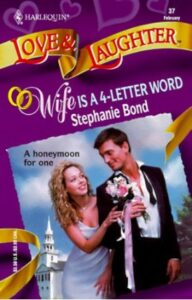
Original cover of WIFE is a 4-Letter Word000000000000000000000 released February 1998. Note that the hero in this book is blond and bespectacled, but the thinking at the time was that blond men were difficult to depict on covers and were less attractive to readers, so my fair-haired hero was given dark hair (and no glasses).
Also, by this time my first book Irresistible? had been out for a while--and to my delight and surprise, had been judged a finalist in the Romance Writers of America RITA Award of Excellence in the Best First Book category. Also, Harlequin had received letters from readers about how much they liked the best friend character of Manny in that book, so my editor asked if I could find a way to include him in WIFE. I did, and that exercise helped me to realize how fun it could be to revisit characters in subsequent books, which I would come to do again and again!
In WIFE is a 4-Letter Word, the jilted groom Alan asks the maid of honor Pam to go with him on his honeymoon—strictly as friends, of course because the strait-laced man and the bohemian woman could never be attracted to each other… or could they?
A couple of years ago Harlequin reverted the rights of WIFE back to me, giving me the chance to update it for re-release. When it comes to writing romantic comedy, there is nothing more delightful than writing about two opposite personalities who are so attracted to each other, they can't keep their hands off each other… and that physical attraction leads to deeper feelings. If you missed WIFE is a 4-Letter Word, it's available in ebook on all the online bookstores:
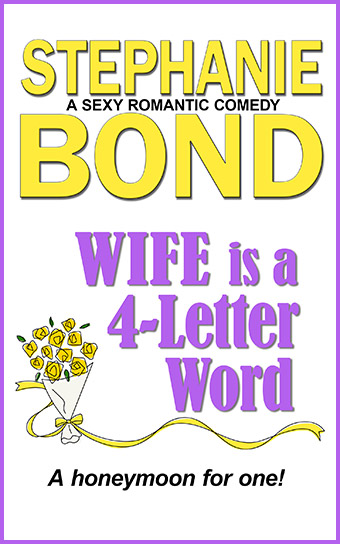
The cover for the updated version of WIFE is a 4-Letter Word
Back in 1998 at the same time WIFE is a 4-Letter Word was released, Bantam released what would be my third and last book for the Loveswept line, Your Wish is My Command. For that book, my editor asked me to retell a fairy tale.
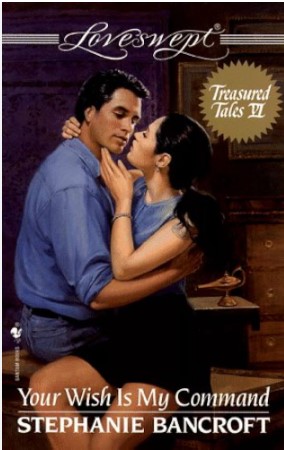
Original cover of Your Wish is My Command, written under my pen name Stephanie Bancroft
I chose the folktale Alladin and His Wonder Lamp, and plotted a modern story around an antiques dealer in Sacramento, California, who's in love with the governor's girlfriend, and who unwittingly releases a genie from a lamp and wishes himself into a hole the size of the Grand Canyon! I really, really love this story and the opportunity to include the hero's family as instigators of the romantic setup. This story reminds me of the old-school romantic comedy movies of the 1980s with a lively cast of characters and a hero and heroine you just want to end up together. I hope you agree! Bantam reverted the rights to me years later and I updated the story, plus changed the title to the more modern-sounding Three Wishes. If you missed Three Wishes, it's available in ebook, print and audio!
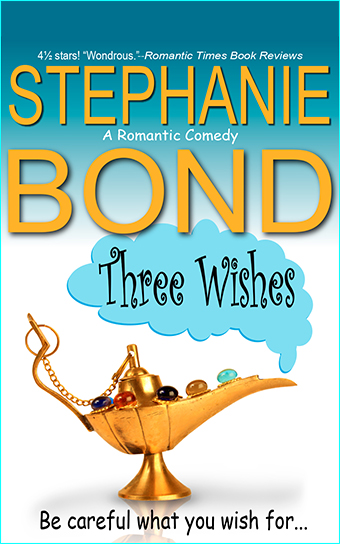
New cover and title for the updated version!
Throughout 1998 I was doing booksignings when I could to promote everything.
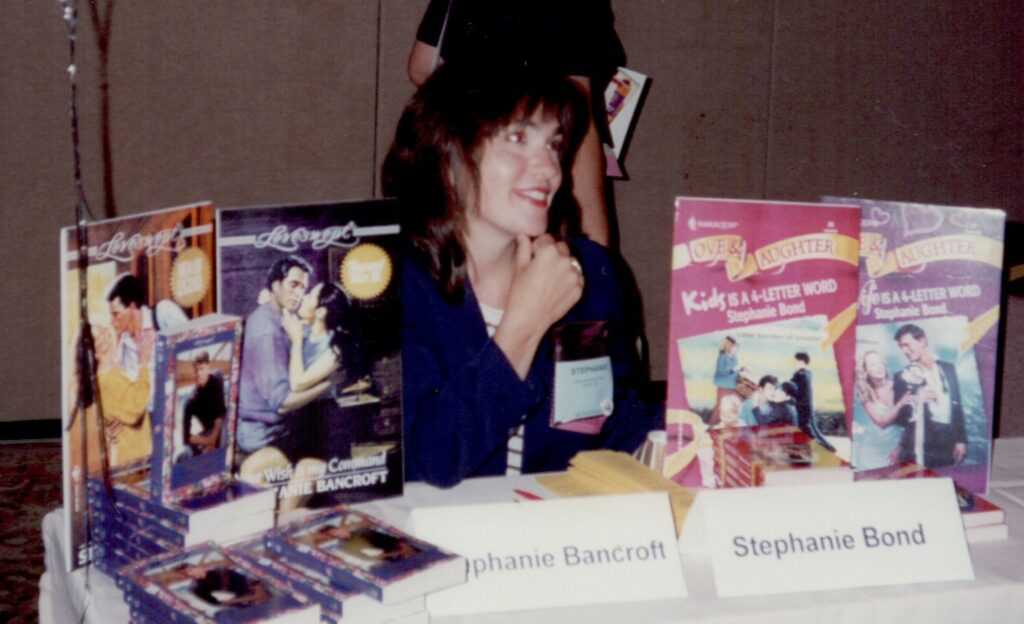
Me at a booksigning for four of my early titles, 1998.
And I LOVE the following photo! The sweet Patty Greenhill who ran the deli at the former Stamper Bros supermarket in Olive Hill was a big fan of my books so she arranged for my books to be sold right there at the meat counter! (The pun wasn't lost on me.) Note the pans of meat in the case below my books. 😊
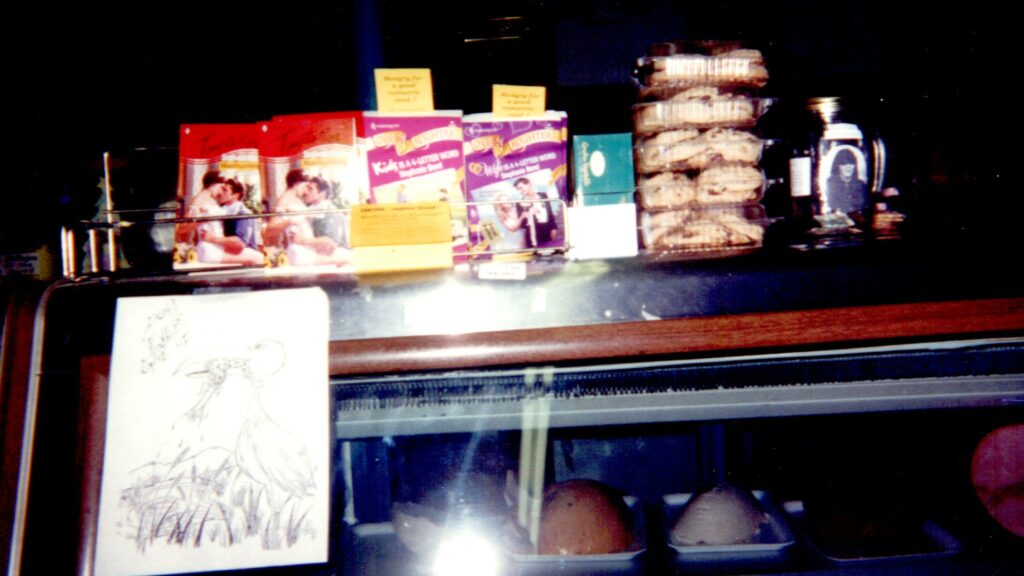
Featured "meat" of the week at the former Stamper Bros Supermarket in Olive Hill, Kentucky!
My career was really heating up and I was writing all day and most nights and weekends to meet my deadlines. I was working on several projects at once—pitching new ideas, writing a current book, doing line edits on a previous book, and proofing galleys on a book about to go into production. It was crazy-making, but so exciting! Things were about to change, however, as I would learn first-hand that publishing lines can sometimes end abruptly, and I would have to pivot. ~